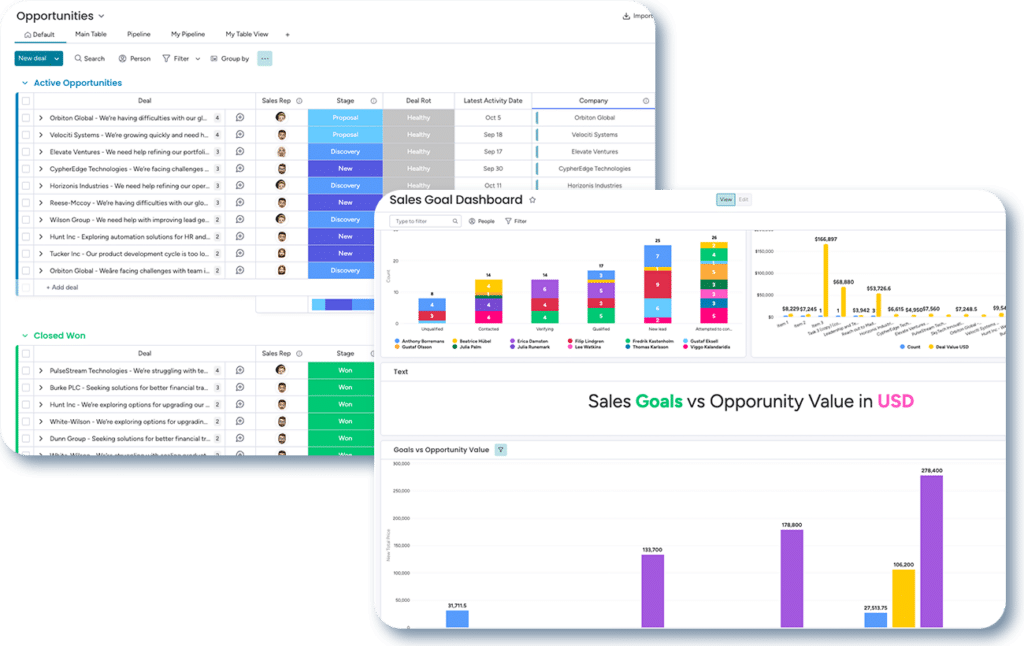Introduction
In the fast-paced world of sales, efficiency is more than just a buzzword; it’s the backbone of successful business growth. As competition intensifies and the global marketplace evolves, maximising your sales pipeline efficiency with CRM tools becomes paramount. This is where CRM (Customer Relationship Management) tools step into the spotlight.
The Pivotal Role of Sales Pipelines
At the heart of every sales endeavour lies the sales pipeline—a systematic and visual representation of the sales process, from the initial contact with a potential client to the closing of a deal. It serves as a strategic roadmap, guiding sales teams through each step and ensuring that no opportunity is overlooked. Yet, managing this pipeline can become a complex task, especially when dealing with multiple prospects, products, or services.
Embracing the Power of CRM Tools
Maximising sales pipeline efficiency with CRM tools is no longer a luxury—it’s a necessity. By integrating advanced CRM platforms into sales strategies, businesses can effectively monitor, analyze, and optimize their sales processes. From automated follow-ups and detailed analytics to real-time collaboration and integration capabilities, CRM tools are redefining the way businesses approach their sales pipelines.
Setting the Stage for monday.com and Make
With numerous CRM solutions available in the market, two platforms stand out for their robust features and seamless integration capabilities: monday.com and Make. These platforms offer innovative solutions tailored to maximize sales pipeline efficiency. In this article, we’ll delve deeper into the unique features of these tools and explore how they can revolutionize your sales pipeline management.
Understanding the Sales Pipeline
The concept of a sales pipeline may be familiar to many, but truly grasping its intricacies and leveraging its full potential is an art few have mastered. Before diving into the benefits of CRM tools like monday.com and Make in maximizing efficiency, it’s essential to lay a foundational understanding of what a sales pipeline is and why it’s critical.
The Essence of a Sales Pipeline
At its core, a sales pipeline is a visual representation of where potential customers are in the purchasing process. It offers a clear snapshot of all sales opportunities and their stages, from the initial lead generation to the final sale closure. Each stage of the pipeline signifies a specific phase in the buyer’s journey, indicating how close—or far—a prospect is from making a purchase.
Why Sales Pipelines Matter
Sales pipelines are more than just a fancy representation—they are a vital tool for sales forecasting, resource allocation, and strategic decision-making. By providing a clear overview of active deals, potential bottlenecks, and sales progress, pipelines allow businesses to:
- Prioritize deals that are more likely to close.
- Allocate resources more efficiently.
- Identify areas for improvement or training in the sales process.
- Forecast revenue and set realistic sales targets.
The Stages of a Typical Sales Pipeline
Though the specifics might vary based on the industry or business model, most sales pipelines include stages such as:
- Lead Generation: Identifying potential customers.
- Lead Qualification: Assessing if a lead is a suitable prospect.
- Proposal or Presentation: Offering the product or service solution.
- Negotiation: Discussing terms, prices, and specifics.
- Closing: Finalizing the sale.
- Post-Sale Follow-up: Ensuring customer satisfaction and exploring potential upsells.
Understanding these stages and their unique requirements is pivotal for any business aiming to maximize sales pipeline efficiency with CRM tools. In the following sections, we’ll explore how CRM platforms like monday.com and Make can supercharge each of these stages for optimal results.
The Role of CRM in Sales Pipeline Management
The advent of Customer Relationship Management (CRM) tools has significantly transformed the sales landscape. By providing a centralized system for managing interactions with potential and existing customers, CRMs have become indispensable for businesses of all sizes. Maximising sales pipeline efficiency with CRM tools isn’t just a trend; it’s a proven strategy that offers tangible results.
Bridging the Gap Between Strategy and Execution
Sales pipelines are dynamic, with leads constantly moving, stalling, or exiting the various stages. CRM tools facilitate a smoother flow by offering features that bridge the divide between a business’s sales strategy and its on-the-ground execution. By having a clear understanding of where each lead or opportunity stands, sales teams can make informed decisions on how to best approach and nurture them.
Automated Efficiency and Streamlined Processes
Maximising sales pipeline efficiency with CRM tools often revolves around the power of automation. Many repetitive and time-consuming tasks, such as sending follow-up emails or updating lead statuses, can be automated using CRM platforms. This not only reduces manual errors but also ensures that no lead falls through the cracks.
Enhanced Visibility and Analytical Insights
A robust CRM system offers a holistic view of the entire sales process. With real-time data and customizable dashboards, businesses can monitor sales performance, identify trends, and detect potential issues before they escalate. This data-driven approach ensures that sales strategies are continuously refined for maximum impact.
Integrative Capabilities: The Power Duo of monday.com and Make
In the world of CRM, integration is king. Platforms like Make excel in integration and automation capabilities, allowing businesses to connect various tools and systems effortlessly. When paired with the customizable and intuitive platform monday.com, the duo becomes a formidable force for maximising sales pipeline efficiency with CRM tools. The ability to synchronize data, automate workflows, and tailor solutions specific to a business’s needs positions these platforms as frontrunners in the CRM domain.
Omnitas Newsletter
Sign up for our monthly newsletter to stay up-to-date on our latest blog articles, videos and events!
Thank you!
You have successfully joined our subscriber list.
Spotlight: monday.com for Sales Pipeline Efficiency
In the realm of CRM tools, monday.com emerges as a leader, renowned for its intuitive design and comprehensive feature set. As businesses seek solutions for maximising sales pipeline efficiency with CRM tools, monday.com stands out as a platform tailored for this very purpose. Let’s delve into its unique offerings and explore how it can supercharge your sales processes.
An Overview of monday.com’s Capabilities
monday.com is more than just a CRM; it’s a work operating system that enables organizations to run projects, workflows, and everyday work seamlessly. Its versatility is unmatched, catering to diverse industries and departments, including sales, where it shines brightly.
Customizable Boards for Tailored Sales Processes
Every business has its unique sales process, and monday.com recognizes this. The platform offers customizable boards, allowing teams to design their sales pipelines precisely as they envision. Whether you’re managing a simple lead-to-sale process or a complex, multi-stage pipeline, monday.com’s boards adapt to your needs.
Automations and Integrations: The Heartbeat of Efficiency
Maximising sales pipeline efficiency with CRM tools often comes down to reducing manual tasks and promoting seamless workflows. monday.com’s automation capabilities ensure that repetitive actions, like assigning leads or sending notifications, are taken care of without human intervention. Furthermore, its vast integration library, especially with platforms like Make, ensures that data flows effortlessly between tools, keeping all systems synchronized.
Visual Sales Pipeline View for Instant Insights
Visualizing your sales pipeline is crucial for quick decision-making and strategy adjustments. monday.com offers a dynamic visual sales pipeline view, ensuring sales teams can instantly gauge where opportunities stand, identify bottlenecks, and allocate resources effectively.
Sales Forecasting and Reporting for Data-Driven Strategies
With monday.com, businesses aren’t just tracking their sales; they’re also gleaning insights for future strategies. The platform offers robust sales forecasting and reporting tools, enabling teams to predict revenue, understand sales trends, and identify areas of improvement. This data-driven approach is central to maximising sales pipeline efficiency with CRM tools like monday.com.
Enhancing CRM Capabilities with Make
In the quest for maximising sales pipeline efficiency with CRM tools, integration and automation are paramount. While platforms like monday.com bring robust CRM capabilities to the table, the power of Make amplifies these features, elevating your CRM system to new heights. Let’s explore how Make complements and enhances CRM systems.
Introduction to Make’s Integration Capabilities
Make is renowned for its ability to connect diverse applications, creating seamless workflows and automations that would otherwise require extensive manual effort. As businesses evolve and their tech stacks expand, Make stands as a bridge, ensuring that all systems communicate efficiently and effectively.
Complementing CRM Platforms like monday.com
While CRM platforms manage customer relationships and sales pipelines, there’s often a need to integrate with other tools, be it marketing automation systems, email platforms, or financial software. Here, Make shines. Its deep integrations with platforms like monday.com ensure that data flows are uninterrupted, allowing for real-time updates and actions across the board.
Automating Data Transfers and Lead Management
Consider a scenario where a business uses both an email marketing tool and a CRM like monday.com. When a new lead signs up via a marketing campaign, Make can instantly transfer this lead’s data to the CRM. Further, based on the lead’s interactions, Make can trigger automated follow-ups or actions, ensuring the sales team responds promptly and effectively. This is just a glimpse into how maximising sales pipeline efficiency with CRM tools is achievable when harnessing the combined power of monday.com and Make.
The Potential of End-to-End Process Automation
Beyond mere data transfers, Make offers the potential for end-to-end process automation. Whether it’s generating invoices post-sale, initiating onboarding sequences for new clients, or updating inventory systems, Make ensures that every step of the sales process is interconnected and automated. This holistic approach is central to maximising sales pipeline efficiency with CRM tools.
Industry-Agnostic Advantages
The beauty of maximising sales pipeline efficiency with CRM tools, especially with powerhouses like monday.com and Make, is their ability to cater to a multitude of industries. Whether it’s healthcare, finance, e-commerce, or manufacturing, these platforms provide a universal set of tools that adapt to specific industry needs.
A CRM Approach Tailored to Every Sector
While the essence of CRM remains consistent—managing customer relationships and sales processes—the nuances can vary significantly across industries. monday.com and Make stand out by offering customizable features and integrations that can be tailored to match the unique demands of any sector.
Seamless Adaptability across Verticals
Be it sales, marketing, operations, IT, or HR, the quest for maximising sales pipeline efficiency with CRM tools is not confined to just one vertical. The flexibility of these platforms ensures that departments, regardless of their function, can leverage CRM to streamline their processes and boost efficiency.
Going Global: Catering to Diverse Geographies
The advantage of these tools isn’t limited to industries—it’s global. As businesses spread their wings from the United States to Europe, Asia, and beyond, CRM tools like monday.com and integrators like Make ensure that operations remain consistent, efficient, and tailored to local needs. Maximising sales pipeline efficiency with CRM tools becomes a global mantra, resonating across borders and cultures.

Tips for Implementing CRM for Maximum Efficiency
While the tools at our disposal, like monday.com and Make, are incredibly powerful, the real key to maximising sales pipeline efficiency with CRM tools lies in their implementation. Here are actionable tips to ensure that your CRM strategy is both efficient and effective.
Begin with a Clear Strategy
Before diving into the technicalities, define what you hope to achieve with your CRM. This could range from better lead management, improved customer service, or enhanced sales forecasting. Having a clear vision will guide your CRM implementation journey.
Customize to Your Needs
One size doesn’t fit all. Customize your CRM, leveraging monday.com’s adaptable boards or Make’s integrative capabilities, to reflect the unique processes and requirements of your business.
Automate, but with Caution
Automation can significantly boost efficiency, especially with platforms like Make. However, over-automating can make processes impersonal. Balance automation with a human touch, ensuring customers always feel valued.
Regularly Train Your Team
Even the most advanced CRM tool is only as good as the team using it. Invest in regular training sessions to ensure everyone is up-to-date with the latest features and best practices. This step is vital for maximising sales pipeline efficiency with CRM tools.
Clean and Organized Data is Key
A cluttered CRM can be counterproductive. Regularly cleanse your CRM data, removing duplicates or outdated information. Also, establish a standardized data entry procedure to maintain consistency.
Integrate Wisely with Other Systems
The power of CRM multiplies when integrated with other tools, especially when using platforms like Make. However, integrate wisely. Prioritize systems that have a direct impact on sales efficiency, such as marketing automation tools or communication platforms. And, in many cases, you might even discover that these other tools you’re using are now redundant when you’ve implemented monday.com and Make. You can instead replicate these exact usages directly within monday.com, with the help of Make.
Continuously Evaluate and Adapt
The business landscape is ever-evolving. Regularly review your CRM strategy, analyze its efficiency, and adapt to new trends or business needs. Continual refinement is the cornerstone of maximising sales pipeline efficiency with CRM tools.
The Value of Expert Consultation
Navigating the intricate world of CRM tools can be daunting, especially when aiming to extract their full potential. This is where seasoned consultants can make a world of difference. We offer expertise, having assisted numerous businesses across various industries in tailoring CRM tools to their unique needs. From crafting an initial strategy and ensuring seamless integration with existing systems to providing comprehensive training and expert customization, the value of a consultant’s touch is immeasurable. By leaning on our experience and insights, your business can sidestep common pitfalls and accelerate your journey towards maximising sales pipeline efficiency with CRM tools. In the evolving realm of CRM, having a guiding hand can be the difference between good and exceptional results.
Conclusion
As we navigate the intricate labyrinth of today’s business world, maximising sales pipeline efficiency with CRM tools stands out as a game-changer. Whether you’re a fledgling startup or an established conglomerate, the power of CRM cannot be understated.
Embracing the Future with CRM
The modern business landscape is dynamic, with customer expectations and market demands constantly evolving. To stay ahead, it’s imperative to be proactive, and CRM tools provide just the platform to do so. With the capabilities of solutions like monday.com and the integration prowess of Make, businesses are not just reacting to changes but anticipating them.
More than Just Sales Management
While the core function of CRM revolves around managing sales and customer relations, its impact is far-reaching. From streamlining internal processes to fostering team collaboration and predicting market trends, the scope of CRM is expansive. It’s no longer just a tool—it’s a philosophy.
The Power of Integration and Customization
As we’ve explored, the real magic happens when CRM tools are tailored to specific business needs and integrated with other platforms. The synergy between monday.com and Make exemplifies this by providing businesses with an unparalleled advantage in their quest for efficiency.
Setting the Stage for Success
In conclusion, the journey towards maximising sales pipeline efficiency with CRM tools is both exciting and rewarding. With the right approach, strategy, and tools in place, businesses can not only meet their sales targets but also set the stage for long-term success and growth. As we look to the future, one thing is clear: CRM will be at the heart of it.
Level up your Sales Pipeline Efficiency with Omnitas
If you’re eager to embark on a transformative journey, maximising sales pipeline efficiency with CRM tools, don’t venture alone. With Omnitas by your side, you’ll have a seasoned partner equipped with the expertise and insights necessary to ensure success. Whether you’re just starting out or aiming to refine your existing CRM processes, our team is here to guide, support, and propel your business to new heights. Reach out to us today and let’s together unlock the full potential of your sales pipeline.













